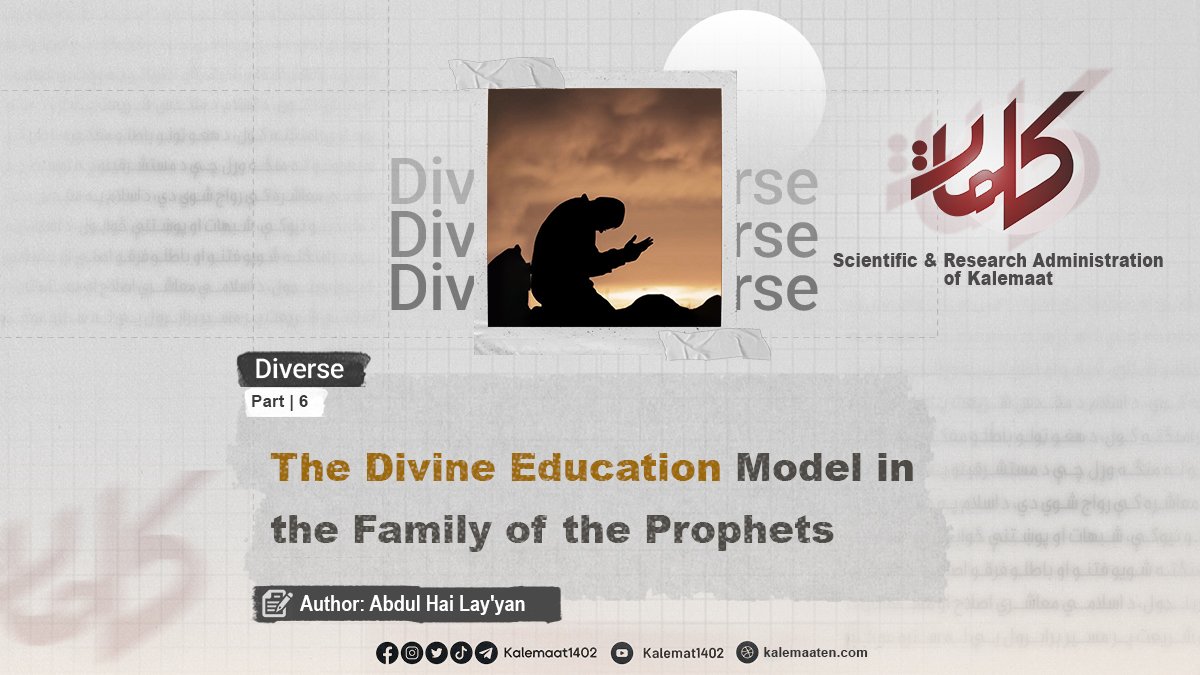Author: Abdul Hai Lay'yan
The Divine Education Model in the Family of the Prophets (Part 6)
Third Teaching: Cultivating the Will and Freedom from the Desires of the Self
Allah Almighty allowed Adam, peace be upon him, in His covenant to eat from all the fruits of Paradise, except for one tree, which was designated as a symbol of a necessary prohibition to strengthen the will, stabilize the personality, and free himself from sensual attachments. This restriction gives the human soul the freedom to break free from the shackles of material needs, so that it is not captured by desires or dominated by them, and this principle is an accurate criterion for measuring human progress; the greater the ability of the soul to manage desires, dominate them, and seek superiority over its inclinations, the higher its position on the path of human development. On the contrary, the more a person is engaged with desires and surrenders, the more he falls towards animal behavior and the elementary levels of existence. Therefore, Divine Providence, which nurtures man, prepared him to accept the responsibility of succeeding the earth by testing his will, awakening his inner strength of resistance, and making him aware of the constant battle between his will and his covenant with Allah.
The first testing revealed its result as follows: «وَلَقَدْ عَهِدْنَا إِلَى آدَمَ مِن قَبْلُ فَنَسِيَ وَلَمْ نَجِدْ لَهُ عَزْمًا» Translation: “At the beginning of the work, We commanded Adam (not to eat from the forbidden tree), but he disobeyed and (ate from it), and at the beginning of the work, We did not find in him any right decision or firm will.” [1]
This incident reveals the inherent weakness of man in the face of temptations arranged by the soul and Satan. [2]
Fourth Teaching: The Weakness of the Human Soul in the Face of Temptations
Allah Almighty allowed Adam and his wife to freely eat from all the fruits of Paradise, except from a specific tree that He forbade them from approaching, as it says in the Quran: (وَقُلْنَا يَا آدَمُ اسْكُنْ أَنتَ وَزَوْجُكَ الْجَنَّةَ وَكُلَا مِنْهَا رَغَدًا حَيْثُ شِئْتُمَا وَلَا تَقْرَبَا هَذِهِ الشَّجَرَةَ فَتَكُونَا مِنَ الظَّالِمِينَ) Translation: « And We said: O Adam! Dwell in Paradise with your wife; and eat of its (abundant and delicious) bounty, wherever you wish, in peace and comfort; but do not approach this tree or eat from it, for (if you do so) you will be of the wrongdoers.” [3]
The apparent reason for the prohibition of eating the fruit of a certain tree can be a test to reveal important truths such as the following:
1. To show the inherent weakness of the human soul in the face of temptations and prohibitions;
2. To reveal the nature of greed and covetousness in man;
Apparently, although humans have all the blessings in various colors and flavors at their disposal; the human soul always tends towards the “forbidden.”
This divine test towards the first humans reveals two purposes:
A. To prepare the ground for the descent of Adam (peace be upon him) and his wife to the earth, in order to develop it; as Allah had destined.
B. Identifying the weaknesses and diseases of the human soul (such as greed and inability to control desires) so that they can be treated. As scholars emphasize: “Identifying the problem is half the solution.” As long as a disease remains unknown, its treatment is impossible; but by revealing it, a solution can be found for it.
1. The weakness of the human psyche against instincts;
This fateful test that was performed on Adam (the father of humanity), is recorded as a key event in the ancient history of man. This event revealed the hidden instincts in the human body; instincts that later became the subject of studies by scientists in various sciences such as psychology and sociology. By examining these instincts and emotions, researchers categorized them based on their impact on the psyche of the individual and society (whether in strengthening behaviors or weakening them) and discovered a deep connection between these internal forces and human emotional reactions. The Holy Quran points out that it is an unavoidable necessity to recognize these instincts and be aware of their impact on human behavior and tendencies.
The Holy Quran also emphasizes that psychological emotions and instinctive urges are among the main factors shaping human behavior. These forces act as guides in the path of human life; if they are guided in the path of goodness, they lead man towards goodness, and if they are led towards evil, they open the way for deviation. [4]
This fact is clearly stated in the following noble verse: «فَوَسْوَسَ لَهُمَا الشَّيْطَانُ لِيُبْدِيَ لَهُمَا مَا وُورِيَ عَنْهُمَا مِن سَوْآتِهِمَا وَقَالَ مَا نَهَاكُمَا رَبُّكُمَا عَنْ هَذِهِ الشَّجَرَةِ إِلَّا أَن تَكُونَا مَلَكَيْنِ أَوْ تَكُونَا مِنَ الْخَالِدِينَ» Translation: “Then the devil tempted them (to make the disobedience of Allah’s commandment seem fair to them, to strip them of their clothes, and to make them naked) and to show them their hidden parts, and (for this purpose) he said: Your Lord did not forbid you from this tree except that (if you eat of this tree) you would become two angels, or that you would be among the immortals (in this abode).” [5]
Continues…
Previous Part/ Next Part
[1]. Taha / 115. [1]
[2]. Sayyid Qutb, In the Shade of the Qur’an, Vol. 4, pp. 2353-2354. [2]
[3]. Al-Baqarah / 35. [3]
[4]. Muhammad al-Sayyid, Al-Wakeel, Reflections on the Best Stories, Damascus: Dar Al-Qalam, 1415AH, pp. 25-26. [4]
[5]. Al-A’raf / 20. [5]



